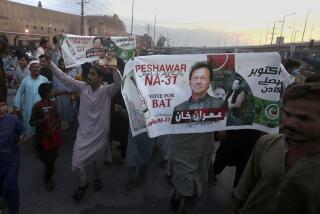Two bombings kill 35 near Pakistani capital
- Share via
ISLAMABAD, PAKISTAN — A pair of suicide bombers, in apparently synchronized attacks, killed at least 35 people today in early-morning blasts near major military installations, Pakistani officials said.
The powerful blasts in the garrison city of Rawalpindi, next to Islamabad, the capital, targeted a bus carrying employees of Pakistan’s spy agency, Inter-Services Intelligence, and a checkpoint outside army headquarters.
The attacks came a day after the Supreme Court, now made up of handpicked loyalists of President Pervez Musharraf, declared that his 3-week-old emergency decree is legal. The latest violence could give him a reason to extend the decree, which amounts to de facto martial law.
The Pakistani leader has been seeking to shore up his position before stepping down as head of the nation’s military, a move that analysts say will significantly diminish his powers.
The court ruling helps solidify Musharraf’s ability to keep the Nov. 3 emergency decree in effect until he is ready to lift it. He has suggested that might not be until after parliamentary elections are held Jan. 8.
Musharraf, who was elected to a new five-year term in October by lawmakers, has until Dec. 1 to relinquish his military post and be sworn in as a civilian president, according to another high court decision handed down Thursday. Aides had said that could happen as soon as today, but then said technical issues would cause a delay.
With the parliamentary elections about six weeks away, it appeared increasingly likely that opposition parties would take part, rather than boycott the vote as they had threatened.
The party of former Prime Minister Nawaz Sharif said he could return to Pakistan over the weekend to lead his party in the elections. Sharif was swiftly deported when he tried to return from exile in September, but Musharraf aides have signaled they may now allow him back into the country.
Sharif, who was deposed by Musharraf in a 1999 coup, remains a foe. But Musharraf could be hoping that his return would divide the opposition. The party of the other main opposition figure, Benazir Bhutto, prepared its list of candidates Friday, apparently setting aside the idea of sitting out the vote.
Opposition parties had complained that elections held under emergency decree would not be free and fair. The Bush administration also told Musharraf this month that emergency rule was not “compatible” with the vote.
Analysts said the opposition parties’ decision to participate would give the vote greater legitimacy, whereas a boycott would have left Musharraf politically isolated.
The general has rejected international condemnation of his emergency decree, which gives him broad powers to muzzle dissent. The Pakistani government said Friday that its suspension a day earlier by the Commonwealth, a 53-nation group made up mainly of Britain and its former colonies, was “unreasonable and unjustified.”
The Commonwealth had given Musharraf until Thursday to end the state of emergency and step down as military chief. The Pakistani statement said the deadline had failed to take into account the country’s “serious internal crisis” posed by Islamic militants.
Under Musharraf’s decree, the constitution was suspended, independent news channels knocked off the air and thousands of activists rounded up.
Most of the channels are back on the air, and the government says nearly all the prisoners have been released, though human rights groups say that cannot be verified.
But senior legal figures remain in jail, and deposed Chief Justice Iftikhar Mohammed Chaudhry in effect remains under house arrest, even though the government said restrictions on his movements were being lifted.
--
More to Read
Sign up for Essential California
The most important California stories and recommendations in your inbox every morning.
You may occasionally receive promotional content from the Los Angeles Times.










